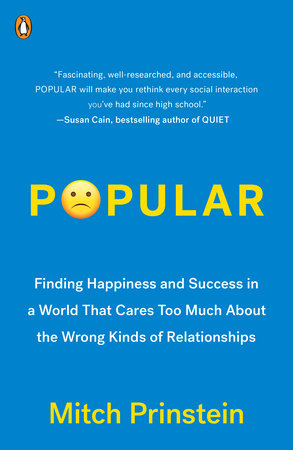Mitch Prinstein, a Professor of Psychology and Director of Clinical Psychology at the University of North Carolina at Chapel Hill, published the book Popular in June 2017, examining the long-term effects of popularity, particularly popularity while growing up. According to Prinstein’s website, his research “uses a developmental psychopathology framework to understand how adolescents’ interpersonal experiences are associated with depression, self-injury and health risk behaviors.”
Proconian interviewed Prinstein on his book and popularity among modern teenagers.
What would you say is the biggest difference between popularity through likability versus status-seeking popularity?
Likability is really about making other people feel included, happy and valued. Status is about making yourself seem better than everyone else. Status is the idea that somehow you have more power, dominance, influence and visibility. People are going to spend more time looking at and paying attention to you than they are their people. That’s kind of the way we think of status. It can be possible to have both high status and high likability, but only about a third of those high in status are very likeable at all. So that’s why you tend to get these as two different styles altogether.
Did your high school experience contribute to how you wrote the book?
Honestly, I don’t think my experience was terribly different from most other people’s. We had a very clear status hierarchy. I grew up on Long Island, and we were able to pick any locker in the school that we wanted. There was a row of lockers that was absolutely, very clearly, the coolest kids’. The distance of your locker from that particular set of lockers was almost like a perfect index of how cool you were. If you were way far away from that central area, you were so not cool. If you had a locker right next to them, then you were kind of popular-adjacent. It was just like you see in the movies, like in Mean Girls. My experience was almost exactly what you would see in one of those movies.
If you had to summarize your book, how would you describe it?
If you are not super popular in high school, then good. You might be better off. The other thing that I think is really important is that our world used to care about likability, especially after you graduated high school, but we really have changed, in a very short period of time, to becoming obsessed with status in a way that is hurting society and today’s teenagers in particular.
Why would you say teenagers in particular are being affected by today’s culture surrounding popularity?
Teens today interact online, obviously, more than people did before, but their interactions online are fun in a fleeting way, and they’re not all horrible and bad altogether. There’s actually a lot of good things about online interactions. But kids always say to me, “I don’t feel as connected. I don’t feel like it’s real.” And the whole Finsta and Rinsta idea? Teenagers keep telling me, with their Rinsta, “It’s fake. I don’t feel like I’m actually making connections. I’m not sharing what I really feel. I don’t know what other people are thinking.” They do Finsta because they’re longing to feel connected. That’s what’s different about teenagers today. The rest of us, at least, remember what it was like to interact with people.
There’s another thing that really bothers me. One time, I saw an issue of Tiger Beat magazine, and the cover said “How to Become Social Media Famous.” That was a message to preteens. And it basically said, “If you’ve ever felt lonely, or upset, or awkward in adolescence (which everyone does), just get millions of followers and you’ll live happily ever after.” It was [basically] telling people: “Post things you don’t believe in, take lots of selfies, say things that you think will get other people to like your comments.” It was really damaging. It said to kids, “Your worth as a human being on this planet is based on a number of likes. This is the thing that makes you important in the world.” No, it doesn’t! That’s wrong! That’s totally wrong! I think people need to know that likes are not the thing that’s most important. Teens are smart and they can figure it out, but there are so many messages saying the opposite. People that are older never had to deal with this.
Did the idea of writing this book in part come from your study of adolescent depression?
I went to graduate school many years ago. So for 25 years, I’ve been involved in research on peer relationships, especially among adolescents—who’s friends with who, and why and how. This book was a review of all the research done by hundreds of researchers in this area, but it was a little bit inspired by the idea of seeing that the world is changed now. Everyone needs a wake-up call and fast. We’re all going down a very dangerous road without even realizing it, and that’s the thing that’s really interesting to me, because we’re biologically programed to care about popularity. Teenagers are biologically programed to think that [popularity] is a super important thing. Whether they say they want it or they don’t want it, they’re tuned into it. We’re biologically inclined to care about what other people think of us. We deeply care. Our DNA changes the minute we perceive that we’re being rejected by others. Our DNA changes expression. That’s phenomenal, right? Parts of our body turn on and turn off the minute that you think you’re being rejected. But now the world has made us think that we should satisfy that itch by chasing the kind of popularity that hurts us, for the first time in the history of our species, rather than chasing the kind of popularity that helps us, which is what we had been doing.












